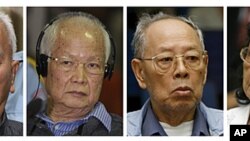The Khmer Rouge tribunal said Thursday it would try the four elderly leaders of the ultra-Maoist movement that ruled Cambodia from 1975 to 1979 on a charge-by-charge basis. The decision means the tribunal will conduct a series of smaller trials of all four defendants, rather than one long and complicated trial.
The decision by the United Nations-backed court means the tribunal will divide the complex multiple charges against the four accused into segments. The four are charged with genocide, crimes against humanity, war crimes and an array of crimes under Cambodian law. What will now take place is a series of smaller trials in which specific charges against the four, and evidence related to those charges, will be heard. The court will start with the charge of crimes against humanity.
Court spokesman Lars Olsen says the decision means the court will hand down verdicts against the elderly defendants as the trial proceeds rather than waiting until the end of a multi-year process to deliver a single verdict. Olsen says this will safeguard the interests of the victims in trying to obtain justice in a timely manner as well as the rights of the accused to an expeditious trial. He says other international tribunals of similar complexity have taken up to 10 years to reach a verdict.
Clair Duffy, who monitors the tribunal for the Open Society Justice Initiative, explains the significance of Thursday’s decision.
“It basically means that what we’re going to see is a much more focused and condensed trial take place next year - and that’ll be a portion of the indictment against these four accused people. A number of allegations but discrete ones," said Duffy. "They’ll kick off with that, and I expect that we’ll see a judgment possibly in 12-18 months on the first segment of the trial.”
The U.N.-backed court has said many times that Case Two, as the trial of the leaders is known, is the most complex since the Nazi trials at Nuremberg. The four on trial are: Nuon Chea, who was deputy to the late Khmer Rouge leader Pol Pot; Khieu Samphan, the regime’s head of state; Ieng Sary, the former foreign minister; and his wife, Ieng Thirith, who was the social affairs minister.
All four deny the charges against them.
The youngest defendant is 79, and the longer their trial drags on, the greater the chance that health problems could disrupt proceedings.
Duffy says that will have been at the forefront of the court’s mind. Other tribunals have seen elderly defendants die during trial without a verdict being delivered. The most prominent of those was the former Serbian leader Slobodan Milosevic, who died in 2006 while on trial at the International Criminal Tribunal for the former Yugoslavia.
“What we’ve seen is aged people or ailing people being prosecuted who have died during proceedings that have lasted years and years after there has been a lot of investment on many levels in those cases. So I would say one of the main reasons would be to try and circumvent that if possible,” said Duffy.
Not everyone will be satisfied with the decision. The first array of charges will deal with crimes against humanity, but will not cover those crimes as they relate to persecution on religious grounds.
The first trial segment also will not examine the charge of war crimes or the charge of genocide, which in the Cambodian context refers to the Khmer Rouge’s killings of Cham Muslim people and ethnic Vietnamese. All of those charges will be dealt with later once the first trial segment is completed.
It isn’t perfect, but the court has little choice. Some of the defendants are ailing, all are old, and the clock is ticking for this tribunal to deliver justice in whatever limited time it has left.
Khmer Rouge Court to Try Former Leaders Crime by Crime




